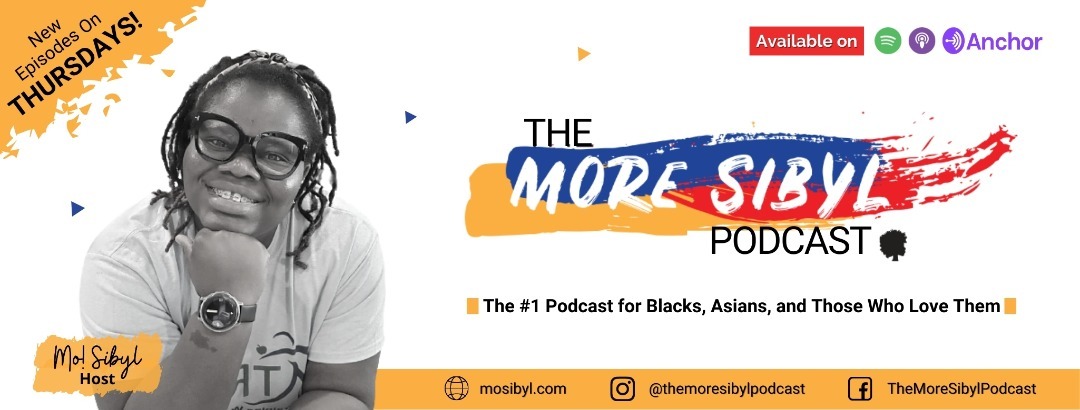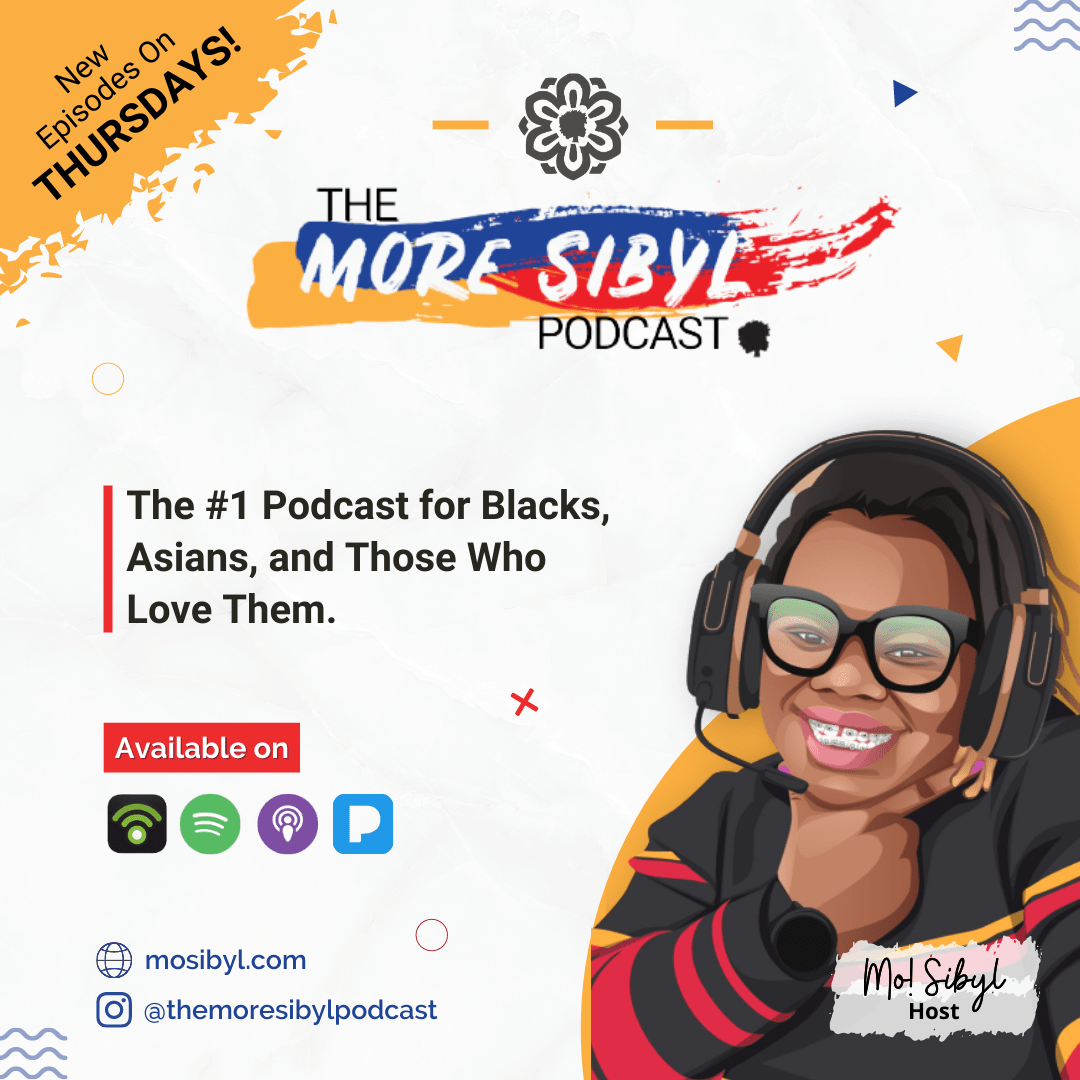
8.9K
Downloads
309
Episodes
The More Sibyl Podcast is hosted by Mo! Sibyl - a Nigerian-born, US-educated, Korean-speaking, Struggling Intellectual. The More Sibyl Podcast is a podcast about culture and culture nomads designed for Blacks and Asians and those who love them. On The More Sibyl Podcast, Mo! talks mostly with an invited guest, who she is inspired by, on a variety of issues, related to cultural experiences or other lived experiences related to third culture. If your concept of home is fluid, you feel like you are neither here nor there, or you consider yourself a cultural hybrid, then this podcast is for you. Support this podcast: https://anchor.fm/mosibyl/support
Episodes

Thursday Oct 03, 2019
Thursday Oct 03, 2019
The More Sibyl Podcast Presents: The One with Dr. Elizabeth Unni - On Integrating Academia and Motherhood
Women rock! Especially in the workplace and more especially in academia. Despite an increasing number of women entering academia, research has shown that women (especially those with children) are less likely to achieve tenure than their counterparts without children. Whereas having children is actually a career boost for men.
As a woman who recently entered academia, I have always wondered if it is possible to have it all at once – family and thriving career and while I am yet to find the answer to this question, it has not stopped me to keep seeking answers. More than answers, I have more questions like “can we really have it all,” “have we been sold a lie about work-life balance?”
In today’s episode, I chatted with Dr. Elizabeth Unni on her decision to prioritize family over career and how she was able to forge a path in academia. We also talked about the perception of how the tenure track might be designed to force women to make a hard choice between career and family. She also talked a bit about her research which identifies patients' psychosocial factors – their beliefs or social factors that can influence medication-taking behavior. You also get to hear about tips for visiting India.
About Dr. Unni: She is an Associate Professor of Pharmacy who received her pharmacy degree from Manipal University in India, an MBA from the University of Louisiana at Monroe. Later, she received her PhD in Pharmaceutical Socioeconomics from the University of Iowa. Dr. Unni is a health services researcher and focuses on the psychosocial aspects of chronic disease management. She loves traveling with her family, reading books, and dancing. She is an active member of the International Society of Quality of Life, International Society of Pharmacoeconomics and Outcomes Research, American Pharmacists Association, and American Association of Colleges of Pharmacy.
Show Notes:
- DONATE HERE:
GOFundme: https://GOFundme.com/f/the-33-project
Paystack: https://paystack.com/pay/the33project
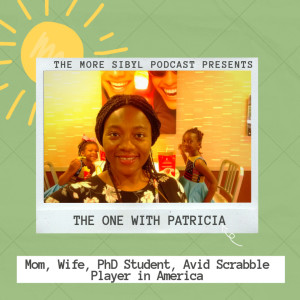
Thursday Sep 26, 2019
미국에 사는 엄마| The One with Patricia Kio – Mom in America: Episode 28 (2019)
Thursday Sep 26, 2019
Thursday Sep 26, 2019
The More Sibyl Podcast Presents: The One with Patricia Kio - Mom in America
Nigerian immigrants make up a lion share of Africans in the diaspora. Today, I bring you the story of one of them – Patricia Kio. She immigrated to the US two years ago with her two little kids to pursue a Ph.D. in architecture at Texas A&M in College Station (that UT Austin wanna-be school). Patricia is an avid Scrabble player and has traveled to over ten Nigerian states and Malaysia to compete in Scrabble tournaments. In this episode, we talked about the struggles of moving to the US, especially the financial and emotional adjustments. We also chatted about gender roles, the traits needed to succeed in graduate school, and my experience teaching in American classrooms. Finally, Patricia answered my question on the many ways architecture, as a field, is embracing technology.
Fun fact for you: Did you know that Scrabble was invented by an architect named Alfred Mosher Butts? He originally named it Lexiko.
PS: The education scholarship has been officially launched. Kindly go on to my GoFundMe page and see how you can be a part of this great initiative: https://www.gofundme.com/f/the-33-project
--- Support this podcast: https://anchor.fm/mosibyl/support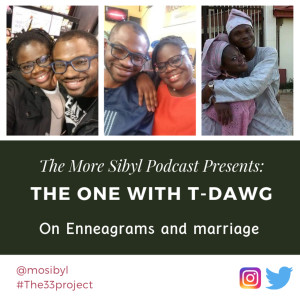
Thursday Sep 19, 2019
내 반쪽| The One with T-Dawg – On Enneagrams and Marriage: Episode 27 (2019)
Thursday Sep 19, 2019
Thursday Sep 19, 2019
The More Sibyl Podcast Presents: The One with T-Dawg – On Enneagrams and Marriage
What do you get when a 7w8 meets a 1w2 or when an ENTP-T collides with an ESFJ-A (his E is highly questionable, BTW)? You get Mo! and T-Dawg! And what do these alphabets and numbers even mean? Well, glad you asked! The former is from the Enneagram while the latter, the Myers-Briggs’ – both personality tests. If you are yet to figure it out by now, T-Dawg is my current husband (haha) of almost a decade and best friend of almost two decades. We are quite the pair of imperfect people, oddly matched but striving to perfection by God’s grace. To know our story is to know that God is involved in the affairs of men. And our story is one we hope to slowly share more of with you as time goes on.
Listen to this episode to hear from a man that I highly look up to and the man who’s behind and beside the tour de force that is Mo! The one I call 내 반쪽(Google that :-D). He is a man of quiet strength and one who does not announce his strength to the world. Also, get to hear our responses to a question sent in from one of the listeners:
Why did you choose him then, and why do you choose him now?
PS: The education scholarship has been officially launched. Kindly go on to my GoFundMe page and see how you can be a part of this great initiative: https://www.gofundme.com/f/the-33-project
PPS: Wanna win $20 (yes, open to everyone)? How well do you know Mo! and T-Dawg? The hints you need in acing this quiz can be found in this new episode? You can maximize your chances of winning, in addition to taking this quiz if you follow my page on Instagram @mosibyl. The winner can reside anywhere in the world. Payment will be transmitted via PayPal, Venmo, Paystack, or Zelle. Winner will be announced by Monday, Sept 23, 2019. Take Quiz Here: http://bit.ly/MoTeeQ2019
Recommended Song:
“By You” – Simi ft. Adekunle Gold (2019)
New Blog Article on Substack:
- Shame in Rest - https://mosibyl.substack.com/p/shame-in-rest
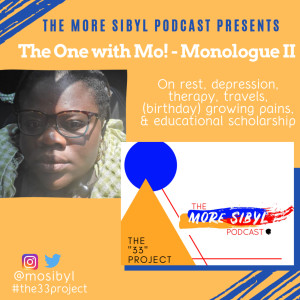
Thursday Sep 12, 2019
모의 일기| The One with Mo!- Mo!nologue II: Unmasking my Thoughts: Episode 26 (2019)
Thursday Sep 12, 2019
Thursday Sep 12, 2019
The More Sibyl Podcast Presents: The One with Mo!- Mo!nologue II: Unmasking my Thoughts
Another monologue coming your way this week courtesy yours truly. In this episode, I got a bit intimate with the mic and shared a lot of the thoughts circulating in my head. Think of it like I was reading my diary aloud.
So, what things did I unearth in this episode, exactly? A lot, actually. Beginning with some personal reflections on stress, rest, and therapy. I also talked about all the travels I did this summer – spanning 11 cities and states and one foreign country, the 5-week cancer fellowship done at the NIH (National Institute of Health) and the amazing people I met, the implications of my beloved therapist quitting her practice, and how my imminent birthday is giving me major depression vibes.
Finally, I am turning 33 in a couple of weeks and I’d like ALL of the attention from that to go towards my educational scholarship – The 33 Project. My goal is to identify and shortlist 33 indigent children in Nigeria who will benefit from the scholarship for a given period of time. I am hoping to raise $3,300. Look out for more information on that, especially how you can be a part of that (yeah, I need your money :-D), please and thank you!
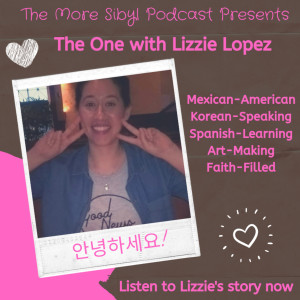
Thursday Sep 05, 2019
Thursday Sep 05, 2019
The More Sibyl Podcast Presents: The One with Lizzie Lopez – Mexican-American, Korean-Speaking, Spanish-Learning Lizzie
Meet Lizzie! A Mexican-American who is learning Spanish. I met Lizzie at my language school (s/o to Northwest Baptist Church); she was one of my former Korean teachers. Lizzie spent a year teaching English as a Second Language (ESL) to Korean elementary students (K-6) in Gunsan, South Korea. Lizzie is also an artist who teaches arts to children and the elderly. She belongs to the Canadian Valley art Guild (CVAG) and loves to paint human and animal portraits, abstract art and illustrations.
In this episode, we talked about her cultural history and what her identity means to her, especially the pressures of cultural expectations. We also talked about the year she spent in Korea and why she won’t be moving back there permanently. She also shared some tips for those considering teaching abroad. Finally, we explored the downsides of being creatives, how to cultivate friendship, and what her faith means to her.
Listen, download, share, and please leave a comment to support the show!: http://bit.ly/LizzieL2019
Recommended Song: “Bidi Bidi Bom Bom” – Selena (1994)
--- Support this podcast: https://anchor.fm/mosibyl/support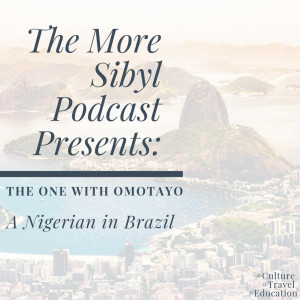
Thursday Aug 29, 2019
마침내 집| The One with Omotayo – A Nigerian in Brazil: Episode 24 (2019)
Thursday Aug 29, 2019
Thursday Aug 29, 2019
The More Sibyl Podcast Presents: The One with Omotayo – A Nigerian in Brazil
It is a well-known fact that Nigerians can be found in several pockets around the world. In fact, it is said to avoid spaces where Nigerians cannot be found because we go where prosperity can be made (#Amirite?). In today’s episode I introduce you to – Omotayo Fadina – a Nigerian living in Brazil. She moved there three years ago to pursue a PhD in Environmental Geochemistry after completing a Master’s degree in the UK
In this episode, we talked about why she left the UK, life being a Nigerian in Brazil, the culture and lifestyle of Brazilians, her research and its environmental impact especially opinions on climate change, opportunities for Nigerians in Brazil, and why we should all include Brazil on our next travel destination.
Finally, we also briefly talked about Yoruba not as a culture but its traditional religious and spiritual concepts, as widely recognized in Brazil.
Mo! Says:
“Han is to Koreans as Hygge is to the Danish people. I wonder what collective term can be used to describe the Brazilian spirit”
Quote:
“The average Brazilian sees happiness as the most important thing. And they derive happiness from interaction with people and nature, rather than in material things.”
PS: Speaking of BRAzil (see what I did there. This is why my friends won’t say hello to me anymore :-D), check out my new post on braffering (a term I just coined about the pains of wearing bras) to hear more about my convoluted history with this contraption of tortures.
--- Support this podcast: https://anchor.fm/mosibyl/support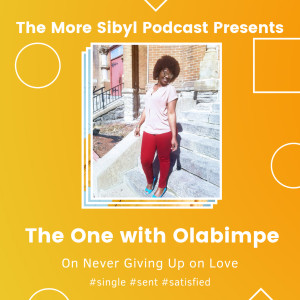
Thursday Aug 22, 2019
Thursday Aug 22, 2019
The More Sibyl Podcast Presents:
From his book – The Four Loves, CS Lewis had this to say about friendship. “The ideal climate for friendship exists when a few people are absorbed in some common, but not always necessary interest. Lovers are usually imagined face-to-face, friends are best imagined by side; their eyes ahead on the common interest.”
That said, here’s reintroducing my dearest friend – Olabimpe - with whom I am well-pleased. Our common interests being doing God’s will, Jesus and plantains (expect a 7-min full convo on our love for Jirade’s plantains: s/o to my supplier – (Mojirade Bepo of Jirade Diadem (@jiradeventures), and fighting injustices in our little spaces. Bimpe and I met when I was 16 when we both signed up to be a part of a choir for teens and youth ministry (@solid_live). So you can say we go a long way, despite how much I moan about not being good with female friendships.
In this episode, you get to hear all about Olabimpe’s story which is a rare opportunity given how private she is. We talked about her being single, a recent heartbreak that almost made her curse the guy out, signs you might be dating a narcissist, how she nursed her broken heart, why she’s still hopeful about love. We also talked about what it takes to be a good friend, the huge fight we had that nearly changed the course of our friendship, as well as conflict resolution tips. If anything, you get to hear two silly friends talk about everything! Yeah, we failed the Bechdel Test a few minutes into the episode.
A friend loves at all times and a brother (or sister) is born for adversity. (Proverbs 17:17)
Question of the Day: Why would a man who’s on his way to marrying someone “commit” himself to another?
--- Support this podcast: https://anchor.fm/mosibyl/support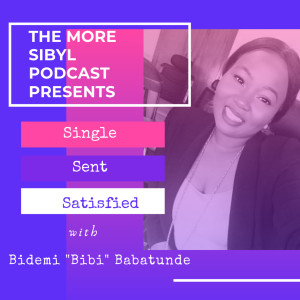
Thursday Aug 15, 2019
Thursday Aug 15, 2019
The More Sibyl Podcast Presents:
This week’s episode with my guest – Bibi – attempted to answer the following questions surrounding single life: How do you maximize your singleness and joy in a world that wants everyone to be coupled up, by any means necessary? What can the church do to encourage everyone, especially singles, to find their life purpose above and beyond the institution of marriage? We also explored the many gifts singles have that are envied by the married (especially yours truly). And yes, we also went there – to talking about premarital sex, porn, and masturbation. And finally, I threw a wild question at my guest as to why it seems that single (godly) men aren’t committing to women these days.
My guest, who is in her 20s and whom I met on Twitter BTW, Bidemi “Bibi” Babatunde, is a minister of the gospel of Jesus with this central message: “God is not angry with you, He expended all His anger on Jesus.” She is passionate about helping believers grow in their full identity in Christ and drop the cloak of meaningless religiosity. She was the best graduating student of her bible college (The Stand Point Church Refinery) in 2018 and currently lives in the Greater Toronto area where she manages fundraising and communications for a charity that helps children with autism.Find out more about her on www.bibilamour04.com or via Twitter bibilamour04.
- Read more on www.mosibyl.com
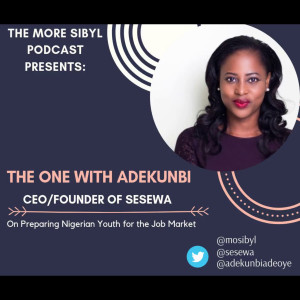
Thursday Aug 08, 2019
Thursday Aug 08, 2019
The More Sibyl Podcast Presents:
Meet Adekunbi Oyelade, a lawyer, youth advocate, and the CEO/founder of Sesewa - Nigeria's first internship-focused career development company. Sesewa was founded in her college dorm room in 2009 while a student of the Obafemi Awolowo University in Nigeria. She founded it due to the frustration with difficulty in getting an internship position.
Subsequently, in this episode, we talked about her entrepreneurial journey, regrets, and future plans. We also did a smooth segue into gender roles and the relative advantage of the gender-selective child-rearing conferred upon the Nigerian girl child as well as tips to balancing this.
Mo! adds: A brief observation about Adekunbi: She’s business, man!
PS: Got some major announcements to make regarding the podcast, if you are yet to subscribe or will like to be in the loop, sign up here: https://www.mosibyl.com/ (scroll down to the very end to “Let’s Get in Touch”)
--- Support this podcast: https://anchor.fm/mosibyl/support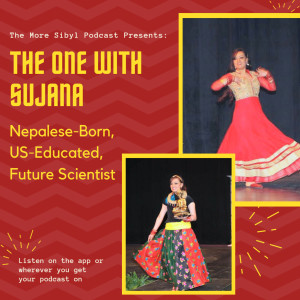
Thursday Aug 01, 2019
Thursday Aug 01, 2019
The More Sibyl Podcast Presents:
Let’s take a trip to Nepal, everyone, with today’s guest - Sujana Rupakheti. Sujana is a pre-med international student from Nepal and she holds a bachelor’s degree in biology with a minor in chemistry and mathematics. In this episode, we talked about her move from Nepal to the US, adjusting to the educational system here, acculturation challenges, and her reasons for choosing the US to pursue a medical degree.
Facts about Nepal
- Their flag is the world's only non-quadilateral flag.
- Despite sandwiched between two super giants – China and India, Nepal has never been colonized.
- In 2001, there was a royal massacre that decimated several members of the royal family.
- Nepal has its own calendar system – the Vikram Samvat and according to it, it is the year 2076
You also hear about the similarities between Nigeria and Nepal and why relocating from either of these countries to the US is not without its challenges.
--- Support this podcast: https://anchor.fm/mosibyl/support